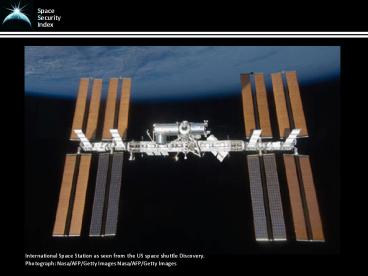International Space Station as seen from the US space shuttle Discovery.
Title: International Space Station as seen from the US space shuttle Discovery.
1
International Space Station as seen from the US
space shuttle Discovery. Photograph
Nasa/AFP/Getty Images Nasa/AFP/Getty Images
2
Space junk drifts towards Discovery shuttle
- A big piece of space junk is drifting toward the
shuttle-station complex and its 13 astronauts,
though Nasa said it would not delay a spacewalk. - Mission control is keeping close tabs on the
piece of European rocket in case it comes too
close to the linked space shuttle Discovery and
international space station. - The debris is expected to pass within two miles
of the space station tomorrow John McCullough,
chief of Nasa's flight director office, said last
night. - That is five miles closer than earlier
projections, but McCullough said it was "looking
very positive" that the shuttle and station would
not have to change direction to dodge the junk. - The debris' oval-shaped orbit, which stretches as
far out as 20,000 miles, has made it especially
difficult to monitor. - Experts estimate that the piece of junk part of
a booster on a three-year-old Ariane 5 rocket
used to deploy a satellite has about 18.5
square metres of surface area. - 3 Sep 2009
3
www.spacesecurity.org
4
The Space Security Index
- The first and only annual, comprehensive and
integrated assessment of the status of space
security - Tracks annual developments on space issues and
changes in long-term trends - Provides policy-makers and legislators with
accurate, objective, and up-to-date information
and analysis - Supports the development of policy to ensure
secure access to space for all
5
SSI Governance and Advisory
- Cesar Jaramillo, Managing Editor, Project
Ploughshares - Dr. Wade Huntley, Simons Centre for Disarmament
and Non-proliferation Research, U. of British
Columbia - Dr. Ram Jakhu, Institute of Air and Space Law,
McGill University - Dr. William Marshall, NASA-Ames Research
Center/Space Generation Foundation - John Siebert, Project Ploughshares
- Dr. Ray Williamson, Secure World Foundation
- Department of Foreign Affairs and International
Trade
- Amb. Thomas Graham Jr., Special Assistant to the
President for Arms Control, Nonproliferation and
Disarmament (ret.) - Hon. Philip E. Coyle III, Center for Defense
Information - Richard DalBello, Intelsat General Corporation
- Theresa Hitchens, United Nations Institute for
Disarmament Research - Dr. John Logsdon, The George Washington
University (Prof. emeritus) - Dr. Lucy Stojak, M.L. Stojak Consultants
International Space University
6
- Defining Space Security
- The secure and sustainable use of space and
freedom from space-based threats - Methodology
- Research on trends and developments
- Online consultation
- Expert review of research
7
Space Security Indicators
- The Space Environment
- Laws, Policies, and Doctrines
- Civil Space Programs and Global Utilities
- Commercial Space
- Space Support for Terrestrial Military Operations
- Space Systems Protection
- Space Systems Negation
- Space-Based Strike Systems
8
The Space Environment
2007 Breakups 2007 Breakups 2007 Breakups 2007 Breakups 2007 Breakups 2007 Breakups
Parent Object Country Date Estimated Number of Pieces Cataloged Number of Pieces Lifespan of Pieces
FY-1C PRC 11 Jan 2,600 2,300 Long
Beidou PRC 2 Feb 70-100 0 Long
CBERS-1 PRC/Brazil 18 Feb 100 66 Short
Aux Motor CIS 14 Feb 60 0 Long
Briz-M CIS 19 Feb 1,000 0 Long
H2-A Japan 28 Jul 14 14 Short
UARS USA 10 Nov 4 4 Short
Delta IV USA 11 Nov 25 0 Short
9
Space Support for Military Operations
- US continues to dominate military uses of space,
but concerns about future capabilities - Early warning
- Secure communications
- China trying to achieve independence in outer
space - More states seeking a variety of independent
military space applications, largely through
dual-use programs
10
Space Systems Negation 2007
- Ground station and communication links remain
vulnerable - Chinese ASAT test
- Continued proliferation of dual-use negation
technologies - Ballistic missile proliferation
- Anti-ballistic missile systems development
- Continued RD of potential dual-use negation
technologies
11
SSI Reach
- Space is in the news more than ever. With both
Iran and North Korea developing space programs,
and with both the United States and China
demonstrating new capabilities to shoot down
satellites, international concerns for space
security have never been greater. - In the Space Security Index, policy makers,
journalists, and technical professionals, as well
as those just interested in space, have a single
reliable resource for information on space
security. There is no more comprehensive and
up-to-date source of information on developments
in space, and the threats to space security. - Hon. Philip E. Coyle
- Senior Advisor, Center for Defense Information
- Former Assistant Secretary of Defense and
Director, Operational Test and Evaluation, US
Department of Defense

